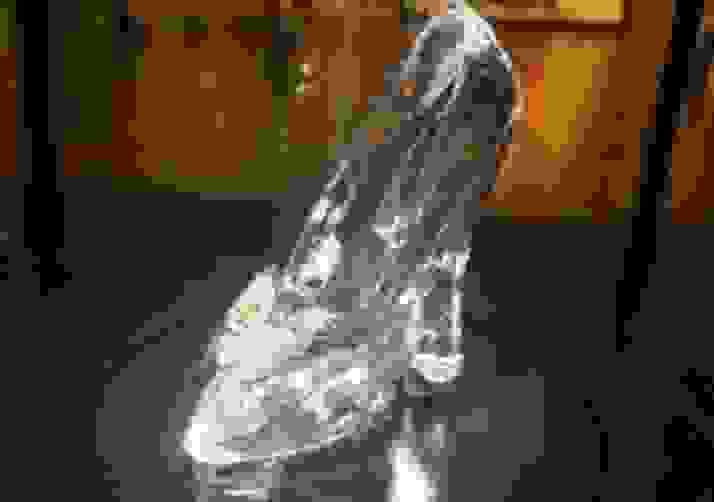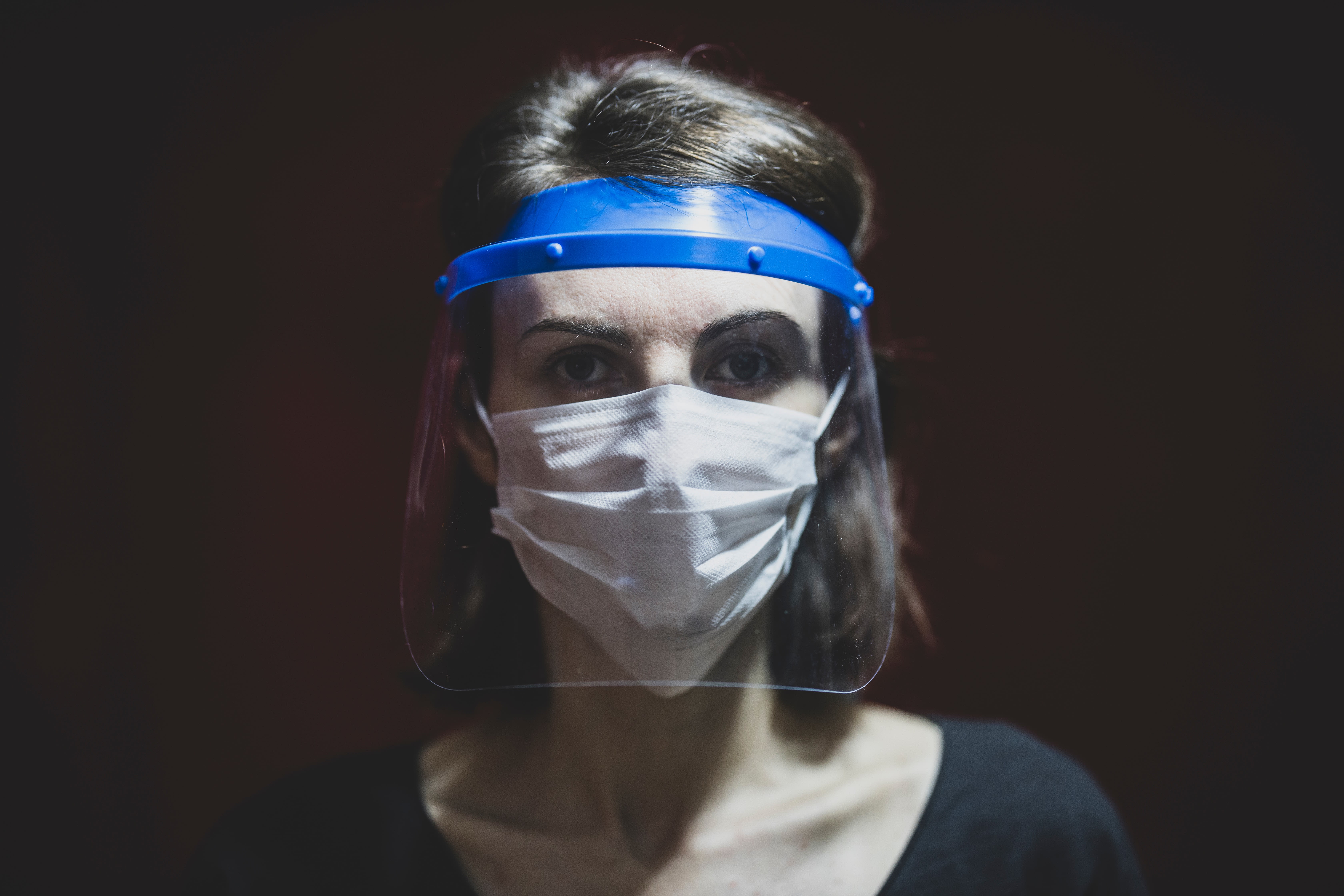Chapter 16: Diagnosis F31.73
“Sallie, you have bipolar disorder,” *Dr. Lane stated.
Bi-po-lar dis-or-der, bi-po-lar dis-or-der stomped across my mind. I bit my lip. I measured the syllables: three in each word. Rigidity seized my body. My pupils were pinned down. My spine was a steel rod. Someone could slam it with a sledgehammer, and I wouldn’t crack. Everything went numb. But I felt my other self. I saw her. Though Dr. Lane could not see her, I could. This had happened before: “Trauma,” the nurse had said back at the Dallas hospital. “She’s dissociating.”
Someone had just assaulted me with a staple gun: Rat-a-tat-tat…Rat-a-tat-tat…Rat-a-tat-tat. Stop hurting me! sliced through me, and my face burned. I folded over, grabbed my shins, clawed my fingernails into them, and jerked my knees up. The heels of my brown flats dug into the sofa cushion. I needed to protect my face. Cover it, Sallie, cover it. Goddamn it, cover it! Was my brain falling apart? Was my life falling apart? I whipped my arms across the top of my skull and bore down. I heard my back pop. I stared into my abdomen, an expanding and contracting cavern of growling nausea. Of defeat. I had lost.
“Sallie, Sallie, can you hear me?” She had wheeled her chair closer to me. She wasn’t touching me, but she was leaning into my space. Trying to connect with me?
Pinch yourself, Sallie, grip yourself, I thought. Echoes of the social worker at the hospital soothing me with those “grounding words” returned. However, I was a frozen statue. I could not cry. My tongue was sandpaper reaching back to my collapsed vocal chords.
What the fuck are you telling me? I tried to scream. But I couldn’t. So I slapped my legs down, feet on the floor, and then I was pulling my hair. Saliva seeped from my mouth as I gnawed at tips of my jagged hair. When was the last time it had been cut? Sweat drizzled down my back, and I stroked my lower back. I watched her, chest rising and dropping, slow measures of her breaths. She had moved back, closer to her desk, and I focused on her face. Her eyes had widened, gentle depths of sapphire experience. She sat still. Her arms were folded in her lap. There was enough space to cradle a baby had someone passed one off to her. She had delivered this news before.
“Will I die from this disease?” I asked. I stared out the small window behind her. The grey afternoon starkly contrasted the fluorescent office lights. My eyes scanned above her desk—framed diplomas and another print. She waited, and I continued to watch her breathing patterns. I wanted to count her inhales and exhales, but I couldn’t. One, two, then four, no three, give it up, Sallie, give it up, I thought. She looked at my file in her lap and shook her head. Then I fired off more questions: “Will I get this sick again? Will my children inherit this disease?” She reassured me I would probably never get as sick again.
“I think you’re brave, Sallie. You told me your story of what happened on March 30. You came here.” I nodded. I thought of Mark and John and all the other people back home who had helped get me here. My right shoe had slipped off, and I leaned over to slide it over my foot. My shoes had grown a bit looser. Maybe it was the weight I had lost in the last month?
“I need to know if my children will get this.” I grabbed a Kleenex on the side table and dabbed at my eyes. My nose was running, and I sniffled. My sight was blurred as my contact lens clouded up. I wanted to peel them off my eyes, but I knew I would lose almost complete focus on her if I did.
“Sallie, we don’t know for sure. You’re a great mom, and I know you’ll watch your kids. However, it does have a genetic link. Based on what you’ve told us about your dad, he may have had it. It often coexists with addiction.”
“It does?” I asked.
“Yes,” she said. “You’ve told us your father was an alcoholic. The patient anesthetizes his feelings with alcohol, drugs, other addictive substances and behaviors.” I thought about my father. He always arrived home from work at 6:00 p.m. sharp. Then he would retreat to my parents’ bedroom upstairs to smoke a few Winstons, drink a couple of Coors, or maybe even mix a hard drink, usually bourbon and Coke, in our breakfast room to bring upstairs. Sometimes the hard liquor was reserved for the weekend, but occasionally he seemed desperate to escape the pressures of running a bank and raising four children.
During my middle school years, he also contended with my mother beginning to blaze her path toward becoming one of the first Episcopal female priests in Texas. Every now and then, she was absent from our family life. He was left to manage it all. Daddy couldn’t express his feelings well. Usually, we knew how he felt based on the number of drinks he downed and the words he might slur because of them.
“Shit, I’m not ready to come down for dinner!” he would shout at my mother from the top of the stairs. Or, “Baby, I love you, and I’m proud of you for working so hard at your school work. I know that place isn’t easy,” he would say to me. His blood-shot eyes disturbed me. The scarlet lines scrawled across the whites of his eyes seemed to have a life of their own. I wondered if narratives from that day or his past were carved in them. I frequently averted my eyes if looking at my father when he was tipsy or completely plastered. His skin also emitted the putridness of cigarette smoke and alcohol gone sour. Often, I wondered if my father would decay right before my eyes. I loathed him in this altered state.
Dr. Lane must have known I was ruminating on part of my past. How could she not? She had just told me I had bipolar disorder. Wouldn’t I wonder how I might have gotten it? She didn’t rush me through my efforts to process the news. Instead, she said something that startled me, “You know, Sallie, many doctors have bipolar.” I wasn’t sure why this news disarmed me, but it did. I couldn’t look her in the eye; instead, I wiped my eyes and tried to control my spinning thoughts.
Sallie, put on your laser look, I thought. Stare at her and return to the conversation. I rubbed my eyes gently; the tears had lubricated my dry contact lens, and I could see her better. I zeroed in on the lower part of her face. Connecting to her eyes seemed too intimate, too vulnerable at this moment. Her mouth was only slightly open, a soft roundness that had the appearance of a child preparing to blow bubbles. But then, I took a risk and stared at her eyes. They had widened, enough to reflect a reassuring look, and this gentleness slowed my mind’s whirling. “Really?” I asked, in complete disbelief. I was surprised the rigors of practicing medicine could permit such chaos to spin through one’s life.
“Yes, Sallie. It’s okay. You’re getting treated for this disease in multiple ways. You will feel better. And, you will be functioning at a much higher level.” For the first time in her office, I smiled. “Functioning at a much higher level” propelled me into better self-control and a touch of peace. I did not know if she herself suffered from the disease, but it didn’t matter. What mattered was how she had calmed me, how she had risked part of herself. I believed she wanted me anchored in strength and hope. And I believed she wanted to educate me: mental illness does not have to carry the stigma so many assign to it.
“Is there anything else today, Dr. Lane?” I asked. I had inched to the edge of the sofa, stretched one leg out to step up, and leaned over. I felt empty-handed, like maybe I should have had a small notebook to take notes. I didn’t quite know what to do with my hands. I repeatedly curled my fingers into fists. My knuckles had a bleached, raw appearance. My veins protruded like pale blue haphazard flowing rivers. I wrung out my hands, like a woman who’s been washing dishes and hasn’t yet grabbed the dish towel. Because I felt awkward clutching nothing, I decided to cross my hands in my lap.
“No, Sallie. We’re done for today. I appreciate your honesty. I’ll be seeing you again at the end of the week,” she answered. I thanked her, walked to her door, opened it, and crossed into the quiet, still hallway. After closing the door, I exhaled and began to wander back to my bedroom. The fluorescent lights over me seemed extra intense. I massaged my eyes again and felt myself wobble a bit. The air seemed thick, as though I were moving through an alternate atmosphere. Was I off-center? I wondered. I held onto the wall’s wooden rails until I reached the common room, only a few yards from Dr. Lane’s office. One patient was reading the newspaper; another was near a phone booth seemingly waiting on a call.
I noticed how someone had scattered puzzle pieces off a table onto the floor. They were a 1,000 piece tangled mess of blues, oranges, fragments of mountains, and parts of a village nestled in their valley. I walked around them, as though dodging shards of glass. Goddamn it! I thought. I had an idea who the person was, and I knew the others would be just as enraged. We had been working on it for a long time as we shared various parts of our life stories with each other. The person whom I believed had flung it across the table had an obsession with things looking just right, every angle arranged to perfection.
My roommate wasn’t in the room. She might have been at an appointment, in class, or in the kitchen getting a snack. I was so relieved. I slipped each shoe off and reclined across my twin bed. I cherished the bedspread. Soft and thick, in a shade of pine green, it contrasted the more institutional-like thin, white one at the hospital. I rolled on my right side and fumbled through my side table drawer for the portable CD player I had brought to Menninger. Mark had written or called every day, and when he had time, he would send me a small care package. A couple of days earlier, he had mailed a CD he had burned for me. “Calling You” by Blue October was on it. I played it incessantly, and the words would occasionally wrap themselves around me when I felt sadness or homesickness creeping in.
I replayed the song a few times. I didn’t know if he would call today. It was Wednesday which meant he would be especially busy driving our children to their after-school activities. Friends and family were helping Mark, but I knew he cherished driving them to and from school each day. Since he was balancing all our family life, he looked forward to the conversations they could have in the car, ones uninterrupted by phone calls and email. He continued to move through our nightly routine of putting them each to bed. He had not let up in the nine days I had been here, and I worried about him. When we did speak, his voice often sounded strained, even as he told me he loved and missed me. “Calling You” was a perfect song for bridging the distance between us. Blue October’s vocalist had a robust voice. It carried the strength that our own always couldn’t. I remembered when he had asked, “Did you get the CD?” I had smiled and whispered, “Yes, I love you. Thank you.”
Since I had entered Menninger, teachers in Dallas had organized a schedule of dinners to be delivered. I surmised his greatest challenge was helping our children understand why I was away from them. A Dallas doctor had told me to explain to them, “Mommy is sick. My body is fine, but my mind is not.” I had never thought of a mind being sick, except when I read newspaper headlines that announced, “The perpetrator’s mind was sick. He was crazy. That’s why he stabbed the victim.”
I did tell them. But because of their young ages, ten and seven, I couldn’t really comprehend if they understood. Our daughter had become clingy. When we went somewhere together, she latched onto my waist or legs and insisted I stay with her, even as she wandered to the ice cream freezer at the grocery store to choose her favorite flavor. Our son had unusual crying spells, frequently at bedtime, and he became obsessed with wanting a dog. No matter how much I comforted each of them, I felt they sensed their mother had abandoned them. Once our son had proclaimed, “Mommy, you won’t let me get a dog because I am a bad boy!” I had wrapped him in a tight hug and folded my face into his neck, crying. When I let him go, I saw where my tears had dampened the back of his pajama top.
My absence from my children devastated me the most. Mark had to fill that absence for both of us. I felt grateful for the love their teachers and my family and friends were offering them. I had finally given Mark permission to shed the secrecy of my illness. Keeping up a front was bringing us all down. People responded to our crisis, and help arrived. Although I struggled with failing my family, I no longer could witness their deterioration.
In my Menninger room that afternoon, I sat up, numb, on the side of my bed and stared out the one window in the room. I had the sensation of disembodiment from myself, so I decided to speak Dr. Lane’s words: “You have bipolar disorder, Sallie.” They reverberated through my mind. Bipolar disorder…bipolar disorder. Again, I sobbed. My chest heaved, tighter with each repetition, as I gasped in my new reality.
*Name of clinician has been changed for privacy.












